to the doctor who almost killed me
by Brittany Ackerman
THE FIRST TIME I MEET YOU, you’re running late. I haven’t eaten all day. My husband holds his water bottle out to me, but I refuse it. When you finally arrive, your visit is short. Despite the mask that covers your mouth, I can tell you have defined features: deep brown eyes, a strong arch to your eyebrows, a blunt cut of chocolate brown hair, and your eyeglasses with round black frames, a statement. You don’t look at my belly or give me an ultrasound, things I’d expected at a first prenatal appointment. You make note of my medical history—the disordered eating, mental health issues, medications, and a list of concerns. My main one: I’ve barely been able to eat.
You tell me it doesn’t matter what I eat in the first trimester. You tell me to keep a bag of Jolly Ranchers by my bedside, that sour candies ward off nausea. “Eat one first thing in the morning,” you say. You end our first meeting by telling us you won’t be coming to the main office anymore, only taking appointments at a smaller office twenty minutes away. “Something to consider,” you say.
But we stick with you. You know us already. You know me, I think.
The next day, I go for an ultrasound and hear the baby’s heartbeat. The tech tells me I'm five weeks pregnant. When I get home, you call and say I’ll need to have the ultrasound repeated in one week. “The heartbeat isn’t in normal range,” you say quickly, your voice low and chipped, and then, “Do you understand? It could be a pregnancy demise.”
I stand in the threshold between the bedroom and living room, one hand on my stomach, the other grabbing the doorframe, scratching the wood so hard it catches underneath my fingernail.
“I understand,” I say, although I don’t.
Two years later, I no longer have access to my medical portal. All those reports. All the messages. I have to contact Human Resources if I want copies of anything. I want copies of all of it. I want to never see any of it again. The last time I wrote into the portal, I was eating mall Chinese food after buying a new pair of jeans. I am thinner than before my pregnancy by two whole sizes.
You once told me I didn’t have to eat dinner if I wasn’t hungry. You said to make a small cup of oatmeal instead of having a big meal. I thought this advice was revolutionary. I didn’t know how to listen to my body, or that listening mattered or would make a difference. I thought my body was against me, but now I had to learn that my body was not my own.
Do you remember how I got on the scale backwards? I didn’t want to know how much weight I was gaining. I’d ask you if I was doing okay, meaning, is the weight too much, not enough, just right?
Do you remember at my 35-week appointment, how I could barely get my shoes back on? How my socks were cutting into my ankles? You asked, “How long has this been going on?” I hadn’t been wearing my wedding ring on my finger for over a month. I wore it around my neck on a thin silver chain. My fingers were going numb, gestational carpal tunnel syndrome, but I was still walking every morning, trying to take care of myself. My systolic blood pressure was over 160 mmHg.
I had read about preeclampsia, had heard stories, had heard nightmares. High blood pressure, protein in the urine, severe headaches, vision changes, abdominal pain, even seizures. A condition that can develop after 20 weeks of pregnancy. It can affect both the mother and the child. Something about an abnormal implantation of the placenta, how it leads to problems with blood flow.
“If you don’t go to the hospital now, you could have a stroke,” you told me. But I didn’t want to go to the hospital. I wasn’t ready. I was scared. “You’ve gained eleven pounds since last week,” you said, and I got up from the exam table and dove my head into the sink, inconsolable.
I told you I didn’t want to talk about my weight. You turned off the lights and left the room.
You no longer work in labor and delivery, so I am at the hands of the rotating hospital staff. I text you when I'm in labor. I text you when the baby is born. You had said a vaginal labor was ideal, that no one should hope for a C-Section. You must have read the medical notes that I was given two doses of Misoprostol tablets, then a Foley Bulb, which inadvertently caused my water to break, and then an epidural, then Pitocin. You must have read in the notes that I labored for two days while on a magnesium drip and got to 9cm dilated, but a piece of my cervix was in the way. I had an emergency C-section, and I imagined you, my doctor, following along, all the way.
I bring my daughter to my six-week post-op appointment. She sleeps through the whole thing. I tell you I am having pain and you say to schedule a follow-up.
At the follow-up, I have pain during the pelvic exam. I am sent for an ultrasound. Over the next few months, I’m sent for an MRI. Inconclusive. Sent for an abdominal scan. Liver lesions are found. You never follow up. The Hepatologist said I had to get off hormonal birth control, stop drinking, and maintain a healthy weight. “I don’t drink,” I said. “And I weigh 105 pounds.”
“Talk to your OB,” she said.
You told me my only option was a copper IUD. My daughter was now sixteen months old. She was in daycare when we spoke. It was around lunchtime, and I pictured her eating her lunch at the table with all her friends. I imagine her looking out the classroom window at a passing cardinal, the red of its belly catching her eye. She’s calm when she sees the bird, their souls temporarily tethered together by the great mystery of nature.
I schedule the IUD procedure and feel uneasy. You promise me nothing bad will happen. You say you do these in your office every single day, multiple times a day. So many women. So many bodies. So many exam tables, feet in stirrups, paper gowns, heads tilted back, hands grasping the table’s edge, mouths frowning in pain. You’ve never had a problem. You tell me everything will be fine.
Let me tell you what it feels like to die. At first, it’s just a cramp, sharper than usual, a twist low in the pelvis that keeps you in bed, palm against your belly like you are trying to still the motion of something foreign. But it won’t be still. The pain builds quietly, then with conviction, radiating, blooming dark and wide across your abdomen like ink in water. Nausea curls up your throat and your legs tremble with the effort of standing. You undress from blood-soaked garments. You fall to the bathroom floor. Something inside you is torn. Tender is the wrong word. You are dizzy, your body failing to keep up with what it’s losing. You feel every beat of your heart, slower, heavier, like it’s trying to speak through flesh and tell you something is not right.
It’s been a year since the surgery that saved my life. I was never able to find a lawyer for medical malpractice. No one wanted to go up against you, a university doctor. I Google you often and try to find a bad review, but they’re all positive. All glowing. You are personable, respectful, professional. You make women feel comfortable. You are a wonderful doctor. You come highly recommended. You are amazing, intelligent, kind. Your guidance is trusted, completely.
I suppose I could write in one of my own. I could say that you improperly placed my IUD and it perforated my uterus and stomach lining. I could say that even after I called and messaged your office in pain, no one ever called back or seemed concerned. I could say that even after I asked you to call my husband and stay in touch with him, you did nothing.
Another doctor, a surgeon from the women’s wing at another hospital across town, ordered an ultrasound and confirmed the IUD was inserted wrong. “This isn’t common,” she told me.
“You should make any calls you want to make,” the surgeon told me as blood pooled underneath me in the bed.
You wrote back one message, What hospital did you go to? You never called. You never checked in. I was your patient for my entire pregnancy, and you didn’t care that I almost died because of you. I want to erase those words, because of you, but it’s true. I know it wasn’t your fault, that in a court of law, my trauma wouldn’t hold up. I signed away my life on a dotted line in order to get that IUD. But there was no compassion. There was no resolution. There was no, I'm so sorry this happened to you. There was no I'm sorry. There was no I. You were nowhere. You are nowhere. You are no one anymore except the doctor who almost killed me.
Back in your office with the beige walls and the nature photography reprints, the music videos from the ‘80s plays on a loop in the waiting room. You tell me, “This will all be over soon,” and it’s the last thing you’ll ever say to me in person. You hand me a sedative, Diazepam, before my procedure. I have to take it in front of you and then sit in the waiting room until it kicks in.
Months later, after we move back to California from the Southeast, I am finally ready to speak to you. When I ask the office manager if you are aware of what happened, she tells me you will reach out in the portal. I wait for your message. A few days later, I open the portal to find it: “I hope you are doing well in California. Let me know if you have any questions.”
My therapist asks me, “How has your body kept you alive?”
“It hasn’t,” I say. “If I didn’t have that corrective surgery, I would have died. Like, if we were still living in caves, my body would have failed me.”
“That’s not necessarily true,” my therapist says. “Bodies are capable of miracles.”
Why am I telling you this?
Why would I want you to have the satisfaction of knowing I go to therapy because of you? Or would it bring you pleasure to know that for a year, I couldn’t walk into a hospital without having a panic attack? Would you get any joy out of knowing you ruined my life?
Or would you tell me to go into my daughter’s room, stand over her crib as she sleeps, and thank my lucky stars to be alive? Would you tell me to move on, to get on with my life already? Would you tell me that harboring this resentment doesn’t do anyone any good? You’d say something about how stress can cause its own ailments. You’d say this isn’t good for me at all. You’d tell me to find some peace, some inner strength; if not for me, then for my daughter, for my family, for everyone around me who has to deal with me. You’d tell me that this is the price of being a mother. Our bodies mean nothing to the world. Our bodies are not for us anymore.
You once told me that your son hated bath time so much, he fought you tooth and nail every single night. The bath took hours, you told me, countless painful hours.
You once told me that when your family pisses you off, you tell them to fend for themselves so you can go to an evening Pilates class or go for a long run or take time for yourself that would otherwise be spent on them.
You once told me that I would never make another decision for myself again, that everything from now on would be for my daughter’s wellbeing.
I suppose I could have died that day, but somewhere deep inside, somewhere in the brokenness, the depleted self, the withering away version of me that flickered like a dying ember, some part of me decided it was best for her if I stayed alive.
In the summer, only three months after my surgery, a new OB prescribes an estrogen-free pill that’s safe to take with my liver lesions. The lesions shrink over time. My enzyme levels are stable.
I am healthy again. I am alive.
Sometimes I want to text you a photo of my daughter. Sometimes I want to text you something hateful and horrible.
I think back to our first meeting in the office. What if I had chosen to switch doctors, what if I never saw you again and you never had the chance to hurt me, what if I never almost died and had to carry this trauma along with all the other traumas I already hold?
I think most about your eyeglasses, the round black frames, how they are your signature. I think of your eyes, the sharpness in them. In my mind, I try to hold your gaze, like a game of who will blink first. Even in my mind, I always lose. I always look away.
About the author:
Brittany Ackerman is a writer from Riverdale, New York. She earned her BA in English from Indiana University and an MFA in Creative Writing from Florida Atlantic University. She has led workshops for UCLA’s Extension, The Porch, HerStry, Write or Die, and Lighthouse Writers. She is a 3x Pushcart Prize Nominee, and her work has been featured in The Sun, MUTHA, Jewish Book Council, Lit Hub, The Los Angeles Review, No Tokens, Joyland, and more. Her first collection of essays, The Perpetual Motion Machine, was published with Red Hen Press in 2018, and her debut novel, The Brittanys, is out now with Vintage. She has a forthcoming novel with CLASH Books called The Style of Your Life. Her Substack is called taking the stairs.
This story’s cover photo is by Carl McLaughlin.




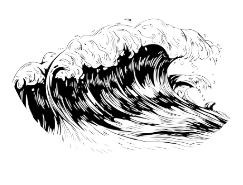
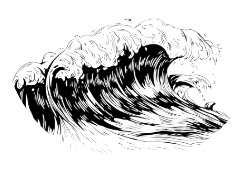
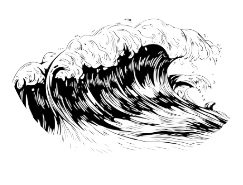
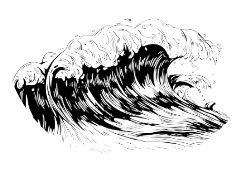
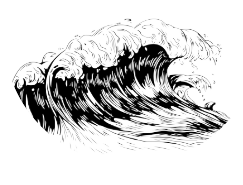
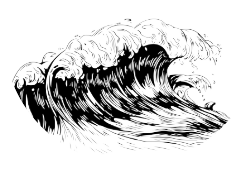
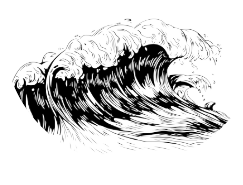
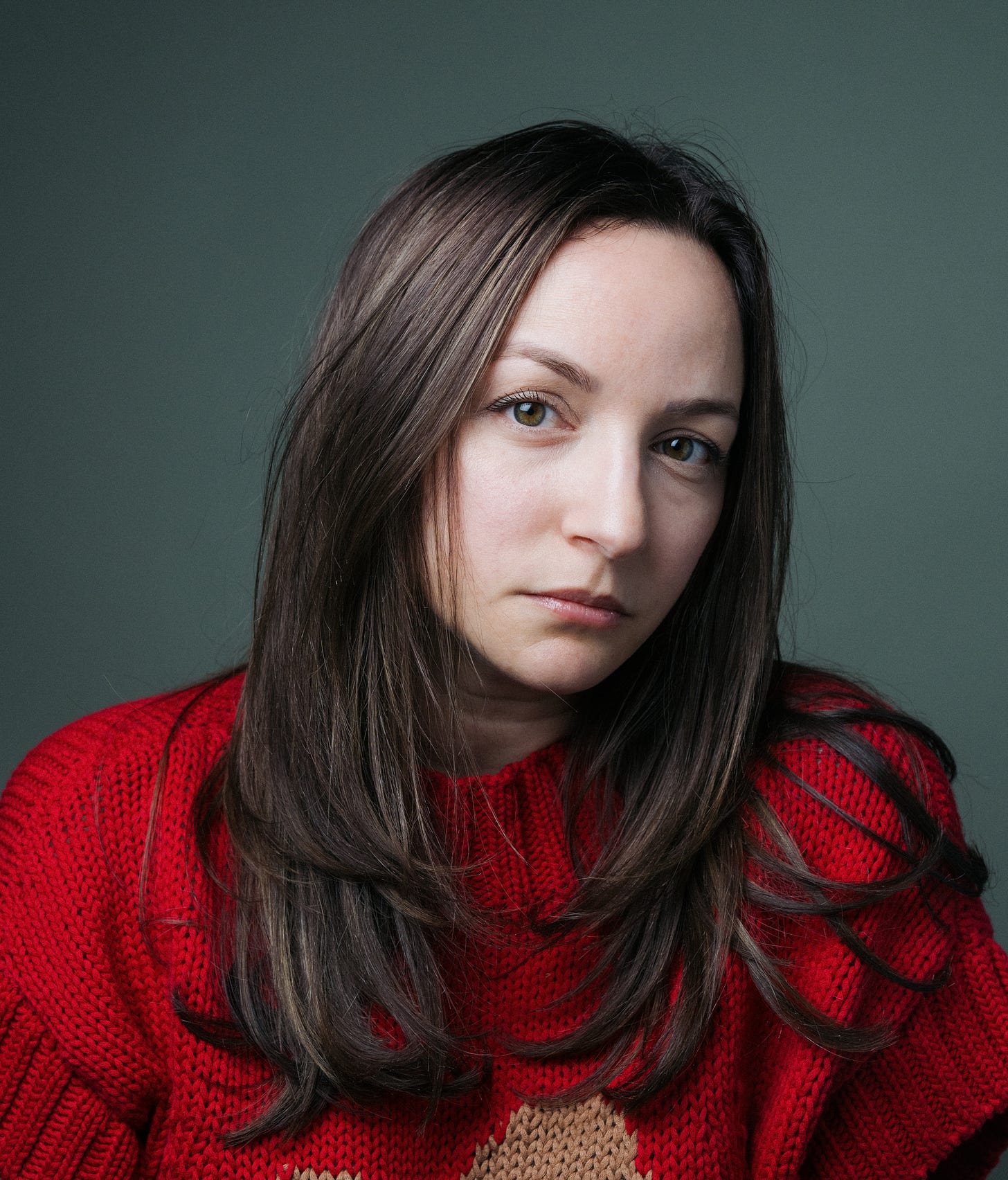
Wow! Terrifying and gripping. I’m glad you survived him and your pregnancy. And I like your writing.
Holy fook!! Wow